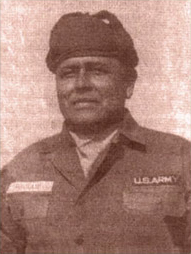NATIVE AMERICANS IN THE U.S. ARMY
Pascal C. Poolaw Sr.
Decorated Soldier Remembered
First Sgt. Pascal Cleatus Poolaw Sr. served this country through three wars, and gave up his life in Vietnam.
Poolaw has been called America's most decorated American Indian Soldier with 42 medals and citations. Among his medals are four Silver Stars and five Bronze Stars. He also earned three Purple Hearts, one for each of the wars in which he fought – World War II, Korea and Vietnam.
The fourth Silver Star was awarded posthumously after Poolaw died during action in Vietnam. On Nov. 7, 1967, Poolaw's unit, Company C, 1st Battalion, 26th Infantry, was part of a search and destroy mission near the village of Loc Ninh.

The unit was attacked by numerically superior Viet Cong forces. Under a hail of fire, Poolaw raced to the lead squad, exposed all the way, and deployed the squad there to lay down a base of fire, the citation read. This action saved countless lives, but Poolaw wasn't finished.
Poolaw continued moving among the troops, making sure they were positioned properly pulling casualties back to the lines despite being wounded himself. He was mortally wounded as he pulled another casualty back to the lines.
His devotion to his Soldiers was exceeded only by the love of his Family. Poolaw served in Vietnam trying to spare his son the horrors of war.
When his son, Lindy, received orders for Vietnam, Poolaw volunteered for the combat zone with the hope of serving there in place of his son. Regulations prohibit two members of the same Family from serving in combat at the same time without their consent.
Another of Poolaw's sons had already been in Vietnam, which added to his wanting to spare Lindy. His son, Pascal Cleatus Poolaw Jr., a Spc. 4, had been wounded in Vietnam in February 1967. The younger Poolaw was hit by a mine and received metal fragments in the legs. His right leg had to be amputated below the knee.
When the senior Poolaw finally reached the port of departure on the West Coast, he discovered Lindy had left for Vietnam the day before. He decided to follow his son.
Having the father and son of the Family serving in combat at the same time was nothing new to Poolaw. He had served in World War II with his dad, Ralph Poolaw Sr., and his two brothers.
Poolaw served almost four months in Vietnam before the fatal combat operation. In a letter he wrote just before his death, Poolaw said he rated his job as being more important than his life.
In her eulogy at Poolaw's funeral at the Fort Sill Post Cemetery, his wife, Irene, echoed those sentiments. “He has followed the trail of the great chiefs,” she said. “His people hold him in honor and highest esteem. He has given his life for the people and the country he loved so much.”
The example of Poolaw's bravery and devotion lives on at Fort Sill, where he served for a year before going to Vietnam. Poolaw Hall at Sheridan Road was named after him and contains an exhibit dedicated to the American Indian Soldier.
